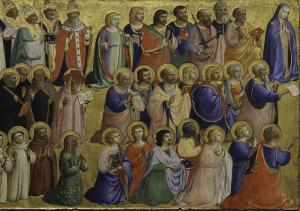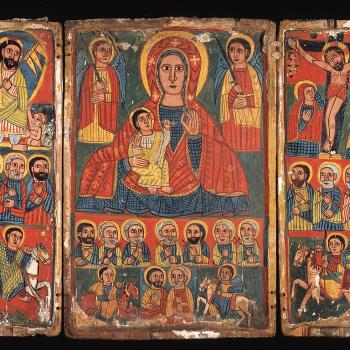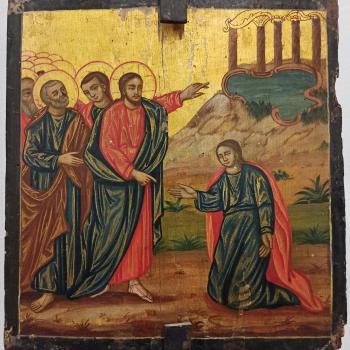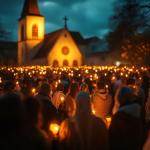
While we are called to love everyone, Christians are to have a special love for each other, a love which allows them to come together as one, that is, as the body of Christ. Christians are joined to Christ (in baptism), so that Christ is able to work through them, continuing his work in the world with and through them. Christians, therefore, are meant to work with Christ, doing works of love. This is why Christians should be known for their love, for they should be known to represent and continue to provide the love which Christ presented to the world (thanks to Christ working in and through them). That love should motivate them to work together for the sake of the common good, and that means, not just for the good of Christians, but for the good of everyone.
As a body has many parts, each which have their own unique quality that helps the rest of the body, so every Christian finds their own unique place in Christ’s body. Each of them, by being a part of Christ’s body, shares the Spirit of Christ, and if they maintain a healthy spirituality, one which has them open to the direction the Holy Spirit, with a willingness to go where the Spirit should lead, they will be able to bring positive change to the world.
Proper Christian spirituality will give them a proper respect for each other, but also, a proper respect for all creation. Such a spirituality will have them ponder themselves and their actions, looking to see what mistakes they have done, what sins they have committed, so that, when they find them, they confess it, that is, admit it to themselves (and to others), and then do what they can to repent and change their ways. When they do this, when they confess their sins, when they experience some contrition for what they have done, they will find the Spirit giving them the spiritual medicine they need to restore them to their spiritual health, freeing them then to properly engage the role they have been given in Christ’s body.
Christians are to work in harmony with each other, they are to look upon each other with love, praying for each other, helping each other, through prayer but also by deed. They should be open to each other, willing to admit their own spiritual imperfections, of their own need for grace, for that will help them motivate each other to properly open themselves up to the Spirit so as to receive the grace which they need. In doing so, they will be following James who said, “Therefore confess your sins to one another, and pray for one another, that you may be healed. The prayer of a righteous man has great power in its effects” (Jas. 5:16 RSV).
We find in the body of Christ, in the church, all those who have been incorporated into it, no matter when that happened, be it in the present, the past, or, in theory, the future. Christians are made alive in Christ: God is the God of the living and not the dead. All who have joined themselves with Christ participate in the true life, the life of Christ, a life which transcends temporal existence. This is why those who lived in the past, though they experienced death, are not to be said to be dead, but alive: they remain a part of the body of Christ. Scripture shows us that they are in God’s presence, looking down upon the events happening in creation, petitioning God on behalf of those suffering. It is due to the connection members of the church have with each other, thanks to being one with each other in Christ, they can intercede for each other, and this is true, not just for those in temporal existence, but those who have transcended it as well:
In the Church we also pray to the saints—not in the same way as we pray to the Persons of the Holy Trinity, but as our helpers, intercessors, and fellow-members of the Church who are already glorified with God in his divine presence. Foremost among the saints and first among the mere humans who are glorified in God’s Kingdom is Mary, the Theotokos and Queen of Heaven, the leader among our saintly intercessors before God. We can also pray to the holy angels to plead our cause before God.[1]
Prayer can be many things; there is a kind of prayer which can be directed to God alone, that is, the prayer designated as adoration. However, prayer can be petitionary. We can petition each other, asking each other for help. We can do this with anyone who is in the body of Christ, so that, when we petition those who have transcended temporal existence, those who are glorified in Christ, they will listen to and response with them with love: “Neither will it be unsuitable if we should say that all the saints who have departed this life, still having charity towards those who are in this world, are concerned for their salvation and help them with their prayers and intercessions with God.”[2] Thus, prayer can be, and often is a kind of request, indeed, that is the original meaning of the word, so that when we ask the saints to work in and with us in Christ, it can be said that we pray to them:
On this it is most certain that prayer is nothing but petition in its genus, and I say this because not every petition is prayer, but only that petition which is directed to God or to some person or persons on account of him. For we are said to pray to the saints or angels when we direct prayers to them. [3]
Christians must not confuse the saints with God, or think they are equal with God. Few, if any, do so, which is why those who try to associate the invocation of the saints with polytheism misunderstand what is going on when the saints are invoked. The saints are a part of the body of Christ. They will continue to pray and work on behalf of the world in their glorified form – they will not have lost their love for others just because they have found themselves in a new mode of existence. Nor have they lost sight of what is happening in the world. God is a God of the living, and as they are alive, and glorified; they are free, not bound by the dictates of temporal existence. They will continue to do the work which they did in their temporal existence, but now in a new way.
[1] Thomas Hopko, The Orthodox Faith. Volume 2: Worship (Yonkers, NY: St Vladimir’s Seminary Press, 1981; rev. ed. 2016), 62.
[2] Origen, “The Song of Songs: Commentary” in Origen: The Song of Songs, Commentary And Homilies. Trans. R.P. Lawson (New York: Newman Press, 1956), 194.
[3] William of Auvergne. Rhetorica divinia, seu ars oratoria eloquentiae divinae. Trans. Roland J Teske SJ (Walpole, MA: Peeters, 2013), 27.
Stay in touch! Like A Little Bit of Nothing on Facebook.
If you liked what you read, please consider sharing it with your friends and family!
N.B.: While I read comments to moderate them, I rarely respond to them. If I don’t respond to your comment directly, don’t assume I am unthankful for it. I appreciate it. But I want readers to feel free to ask questions, and hopefully, dialogue with each other. I have shared what I wanted to say, though some responses will get a brief reply by me, or, if I find it interesting and something I can engage fully, as the foundation for another post. I have had many posts inspired or improved upon thanks to my readers.











